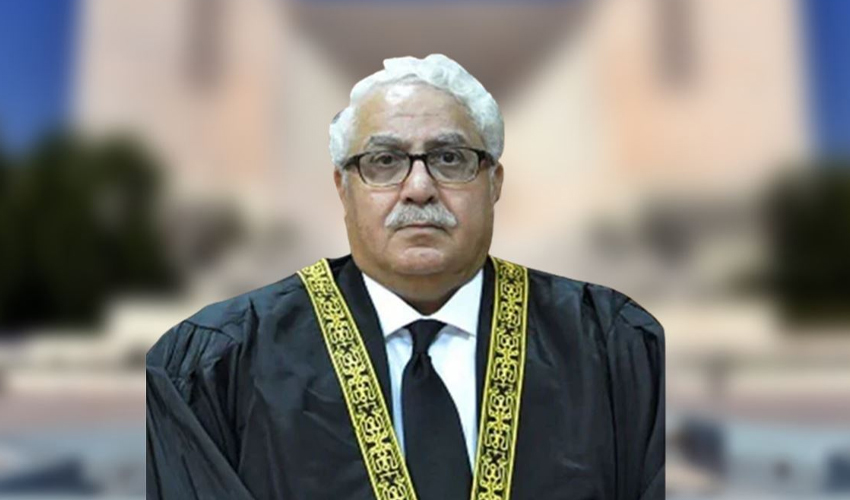The Supreme Judicial Council (SJC) has reached a significant verdict regarding Justice Mazahir Naqvi, finding him guilty of misconduct.
The Council's decision stems from a thorough examination of Naqvi's actions, which were deemed inconsistent with the expected standards of judicial conduct.
Following the verdict, the Supreme Judicial Council has recommended the dismissal of Justice Mazahir Naqvi from his position. The Council’s stance reflects its commitment to upholding the principles of justice and maintaining the integrity of the judiciary.
The Council has promptly forwarded its opinion to the President, seeking approval for the recommended dismissal. This step indicates the gravity of the findings against Justice Naqvi and emphasizes the Council's dedication to ensuring accountability within the judiciary.
In its declaration, the Supreme Judicial Council announced significant amendments to Clause No. 5 of the Judges' Code of Conduct, aiming to address concerns regarding the handling of allegations against judges of the Supreme Court and High Court.
The Council acknowledged the publicizing of allegations against these judges and emphasized the importance of upholding judicial integrity amidst such circumstances. The statement highlighted the judges' concerns regarding responding to baseless allegations and their interpretation of Clause 5 of the Judges' Code of Conduct.
After careful deliberation and consultation, the Council concluded that responding to unfounded allegations does not breach Clause 5 of the Code. Consequently, amendments were made to address judges' concerns and ensure clarity in the application of the Code.
Regarding complaints brought before the Council, six distinct cases were examined, with five of them lacking substantive material for Council action. High Court judges were directed to respond to notices issued by the Supreme Judicial Council within 14 days.
Furthermore, the declaration revealed that nine complaints were reviewed against Justice Mazahir Naqvi under Clause 6 of Article 206 of the Constitution. The Council found Naqvi guilty of misconduct based on these complaints, leading to recommendations for his removal from the position of judge.
On November 22, the Supreme Judicial Council (SJC) issued a detailed show-cause notice to Supreme Court judge Justice Mazahar Ali Akbar Naqvi over misconduct complaints lodged against him.
The SJC — the only forum that can inquire into the conduct of judges of the superior judiciary — by a 4-1 majority ruling directed the judge to submit a reply within 14 days in connection with 10 complaints lodged against him.
Chief Justice of Pakistan (CJP) Qazi Faez Isa, along with three other justices, directed Justice Naqvi to submit a reply within the stipulated time. However, Justice Ijazul Ahsan dissented with the majority opinion during this pivotal decision.
Deliberations within the Judicial Commission, spanning three days, saw the dismissal of a complaint against Justice Sardar Tariq Masood due to inadequate responses to crucial questions.
In the context of these proceedings, Justice Mazahir Naqvi raised objections concerning three council members, representing himself through lawyer Khawaja Haris during the commission’s sessions. Notably, there was a formal request for a stay on the ongoing proceedings, pending a constitutional petition's decision in the Supreme Court.
Previously, Justice Mazahir Ali Akbar Naqvi had taken a bold stance against the Supreme Judicial Council (SJC) in an open letter addressed to the Chief Justice and the judges of the Supreme Court.
In his letter, Justice Naqvi raised grave concerns about the bias exhibited by the head and members of the Council during proceedings against him.
He accused Chief Justice Qazi Faez Isa and Justice Tariq Masood of urging former Chief Justice Umar Atta Bandial to take action against him. He vehemently denied any allegiance beyond the Supreme Court and the people of Pakistan, emphasizing that he refuses to comply with any political agenda.
“I am prepared to face the consequences for refusing to bow down to any undue pressure,” Justice Naqvi asserted, expressing his unwavering determination to contest what he perceives as the unjust actions of the SJC.
Furthermore, Justice Naqvi highlighted an unprecedented event where the Judicial Council proceeded with actions despite filed petitions, signaling a disregard for the judicial process. He criticized the Council’s issuance of a second show cause notice, citing constitutional and legal flaws, and challenged the competence of Council members due to their alleged bias.



























